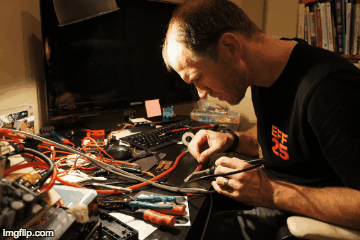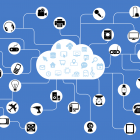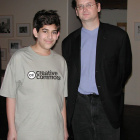×
SparkFun will be closed on Tuesday, December 24th, and Wednesday, December 25th, in observance of the Christmas holiday. Any orders qualifying for same day shipping placed after 2:00 p.m. (MST) on Monday, December 23rd, will be processed on Thursday, December 26th, when we return to regular business hours. Wishing you a safe and happy holiday from all of us at SparkFun!
Please note - we will not be available for Local Pick up orders from December 24th-December 27th. If you place an order for Local Pick-Up we will have those ready on Monday, December 30th.
alicia gibb
Member Since: May 13, 2008
Country: United States
-
Yesh!
-
Already projecting:
Engineer at <3
-
Awesome post! I love all the gifs visualizing the future with IoT! It helps to visualize all that data the is, as you said, often perceived as invisible.
I'm also very glad this post touches on IoT security, it's a conversation that needs to happen to bring awareness of what both companies and individuals need to know about securing their networks and devices.
-
Yes, this product should absolutely be open hardware as it's an undeniable derivative of the Makey Makey and have documentation released under CC BY-SA 4.0
-
Particle accelerator
-
You forgot your embedded power strip!
-
Is this the 2ply or 4ply thread?
-
Aaron had an influence on my career choice to go into open source hardware. He and I worked together for a short time trying to get a couple libraries to give their metadata records (book titles, author names, # of pages, illustrations, etc.) to the open library project. We were met with librarians that believed hoarding their metadata would be better off for their branch, and couldn't see the benefit of sharing data that everyone was buying from OCLC or recreating themselves - over and over and over again... It was during this project I realized that many libraries (not all!) and librarians (not all!) had forgotten their job was bringing freedom of information to the people. So I moved on to a field that I felt understood freedom of information in a more applicable way - open source hardware and software. I'd probably be a librarian right now if Aaron hadn't happened into my life, and I have to say, Aaron Swartz is regarded as the best librarian there ever was in my eyes.
Are there any Memorial hackathons happening in the Boulder/Denver area? It breaks my heart that I haven't been able to make it to any out of state.
-
The concept of Open Source Hardware stands behind paying people for their work. When you hear 'free' in correlation with open source hardware it means libre not gratis, access not dollars. The Open Source Hardware companies out there today pay their employees and pay royalties to the community if they produce someone else's design. It also means people get attribution for their work and the license must remain open virally for anyone else who copies it.
I'm not sure about the Kodak v. Canon model, I haven't researched it. But, I have seen some articles about openness in the music industry. When radios first came out, the music industry was worried people would stop buying music because they could hear it for free, but the exact opposite happened, people bought more, being exposed to new artists. And artists who have released music under creative commons licenses rather than copyright have at time made more money than from their copyrighted albums.
Open is a concept behind the licensing, not behind payment for work. I have been researching economics and patents, especially outside the US and how it relates to US innovation. There's a lot out there which show patents are not correlated with economic growth. Here's a couple resources, hope these help!
http://www.techdirt.com/articles/20090531/0908085070.shtml http://www.dklevine.com/papers/ip.ch.8.m1004.pdf























































